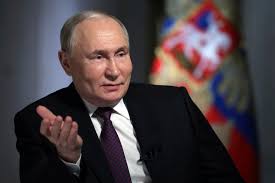
As Putin Marks 25 Years in Power, Has He Truly ‘Taken Care of Russia’?

Putin’s 25 Years in Power: A Legacy of Control and Controversy
As Vladimir Putin reaches 25 years in power, many are asking: Has he truly “taken care of Russia”? Putin’s long reign has reshaped the nation, but the answers are complex. While he has brought stability to Russia, his leadership style has often been controversial. The 25 years of his rule have seen significant transformations, but also deep divisions.
Economic Progress and Challenges
Under Putin’s leadership, Russia has experienced both periods of economic growth and times of stagnation. When he first came to power in 2000, the country was emerging from a chaotic period of post-Soviet transition. Putin was credited with stabilizing the economy, largely due to rising oil prices that boosted Russia’s revenues.
However, over time, Russia has faced significant challenges. Sanctions, low oil prices, and political isolation have led to slower economic growth. While Putin’s government has promoted the idea of economic self-sufficiency, Russia still heavily relies on energy exports. Some critics argue that Russia’s economy remains vulnerable to external pressures, raising questions about long-term sustainability.
Consolidation of Power and Authoritarianism
Putin’s rise to power was marked by a swift consolidation of authority. Over the years, he has tightened his grip on Russia’s political system, limiting opposition, curbing free press, and centralizing power. While many Russians see him as a stabilizing force, others view him as an authoritarian leader who stifles democratic freedoms.
His control over key institutions, including the military, intelligence agencies, and the judiciary, has led to accusations of cronyism and corruption. The lack of political pluralism and the suppression of dissent have drawn criticism from international observers, who argue that Putin has sacrificed democracy in favor of control.
Foreign Policy: A Global Vision and Isolation
Putin’s foreign policy has been one of assertiveness. From annexing Crimea in 2014 to supporting conflicts in Syria and Ukraine, his government has pursued an aggressive agenda. While many Russians support these actions, seeing them as steps toward restoring national pride, they have led to international condemnation and sanctions.
Despite Russia’s growing influence in global politics, the country has faced increasing isolation from Western powers. Putin’s push for sovereignty and his confrontational approach to NATO have led to strained relationships with Europe and the United States.
Social Progress and the People’s Reality
While Putin has implemented policies that focus on improving Russia’s infrastructure, military capabilities, and national security, the situation for many Russians is mixed. There have been improvements in healthcare and education, but the wealth gap has widened. The average Russian continues to face economic hardship, while elites in Putin’s circle have prospered.
Corruption remains a persistent issue. Though Putin has claimed to fight corruption, many believe that it remains widespread in both the government and private sectors. Social inequality, lack of transparency, and the dominance of oligarchs in business have left many Russians feeling disconnected from their government.
Putin’s Future: What Lies Ahead for Russia?
As Putin celebrates 25 years in power, the question remains: what lies ahead for Russia? The country is facing major demographic challenges, including an aging population and declining birth rates. Additionally, the ongoing political and economic isolation may limit Russia’s future growth and global influence.
Putin’s political longevity has allowed him to shape Russia in his own image. Yet, as the world changes, Russia’s position in that world will continue to evolve. Putin’s legacy will undoubtedly be debated for years to come, with some seeing him as a defender of Russia’s sovereignty and others as a figure who stifled the country’s potential.
Conclusion: Has Putin Taken Care of Russia?
In conclusion, Vladimir Putin’s 25 years in power have brought both successes and shortcomings. He has restored order to Russia after the chaos of the 1990s and strengthened its global presence. However, his authoritarian style and the limitations of the Russian economy leave open questions about whether he has truly “taken care of Russia” in the long term.
As the next chapter unfolds, it remains to be seen whether Russia can break free from the challenges it faces and whether Putin’s vision for the country can adapt to the changing global landscape.